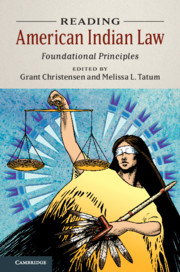Book contents
- Reading American Indian Law
- Reading American Indian Law
- Copyright page
- Dedication
- Contents
- Editors and Contributors
- Preface
- Acknowledgments
- Introduction
- Part I Core Concepts
- 1 Marshalling Past and Present: Colonialism, Constitutionalism, and Interpretation in Federal Indian Law
- 2 The Algebra of Federal Indian Law: The Hard Trail of Decolonizing and Americanizing the White Man’s Jurisprudence
- 3 Red: Racism and the American Indian
- 4 (Tribal) Sovereignty and Illiberalism
- Part II Voices
- Part III Property
- Part IV (Mis)Understandings
- Book part
- References
1 - Marshalling Past and Present: Colonialism, Constitutionalism, and Interpretation in Federal Indian Law
from Part I - Core Concepts
Published online by Cambridge University Press: 11 December 2019
- Reading American Indian Law
- Reading American Indian Law
- Copyright page
- Dedication
- Contents
- Editors and Contributors
- Preface
- Acknowledgments
- Introduction
- Part I Core Concepts
- 1 Marshalling Past and Present: Colonialism, Constitutionalism, and Interpretation in Federal Indian Law
- 2 The Algebra of Federal Indian Law: The Hard Trail of Decolonizing and Americanizing the White Man’s Jurisprudence
- 3 Red: Racism and the American Indian
- 4 (Tribal) Sovereignty and Illiberalism
- Part II Voices
- Part III Property
- Part IV (Mis)Understandings
- Book part
- References
Summary
Marshalling Past and Present: provides an introduction to the Marshall Trilogy, the foundational set of Indian law Supreme Court opinions. These cases announced a presumption that while Congress has plenary power in the area of Indian affairs, that which it has never taken away remains among the inherent power of tribes. Frickey questions whether the modern court is remaining faithful to these principles and explores the implications for Indian country should the presumption of inherent tribal power be eroded.
- Type
- Chapter
- Information
- Reading American Indian LawFoundational Principles, pp. 23 - 46Publisher: Cambridge University PressPrint publication year: 2019



